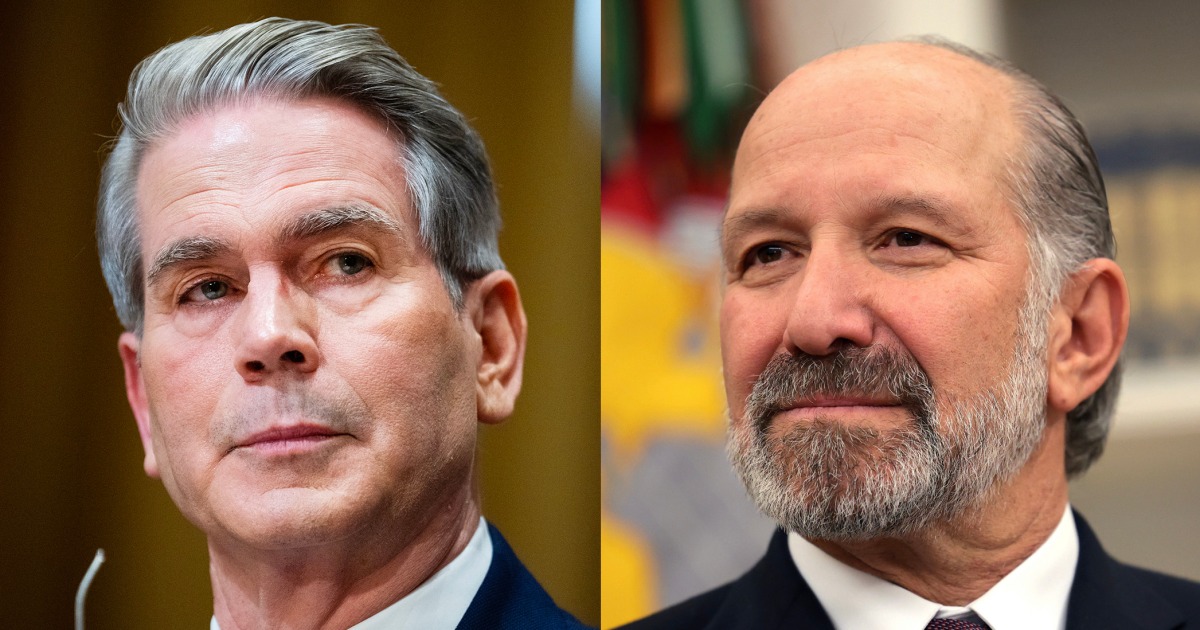Number Six
I like big bots and I can not lie
Trump and his allies hint at economic pain ahead for Americans
While top officials have framed any economic disruption as short term and necessary for long-term prosperity, the comments go against Trump's campaign rhetoric.
Trump and his allies hint at economic pain ahead for Americans
While top officials have framed any economic disruption as short term and necessary for long-term prosperity, the comments go against Trump's campaign rhetoric.
President Donald Trump and his allies have begun suggesting that some economic pain could be ahead for Americans, as the administration carries out plans to slap tariffs on billions of dollars of goods coming into the U.S. and fire thousands of federal workers across the country.
Trump warned Americans in his speech to Congress this week to expect a “little disturbance” from his plan to impose sweeping tariffs on billions of dollars in goods. Treasury Secretary Scott Bessent said there will be a “detox period” as the economy shifts away from government spending. And Commerce Secretary Howard Lutnick said that prices on some items would be going up as a result of tariffs — though he said overall inflation would not increase.
While Trump and top administration officials have framed any economic pain from their policies as short-term hits that are necessary to improve the economy in the long run, their comments go against the optimistic, fast-fix rhetoric Trump deployed on the campaign trail. Trump said in August that on his first day in office he would “end inflation and make America affordable again,” and he denied that tariffs would raise prices for consumers.
The more tempered comments from Trump and his Cabinet come amid mixed signs for the economy. The U.S. added fewer jobs than economists had expected in February, as cuts by the federal government offset some of the hiring gains by private employers. The unemployment rate climbed slightly to 4.1% from 4.0% the month before. Stocks across the major indexes were on track to end the week lower.
Trump told Americans during his joint address to Congress on Tuesday that “there’ll be a little disturbance. But we’re OK with that. It won’t be much.” Directly addressing the impact farmers could feel from retaliatory tariffs already being placed on U.S. agricultural products, as they were during his first term, Trump said “they will probably have to bear with me again.”
In response to a question on Trump’s economic warnings, White House press secretary Karoline Leavitt said that Trump was “being frank and honest."
“The American people elected this president to have monumental reform and change,” and doing so will “require a little bit of disruption,” Leavitt said. She added that the president remained committed to “ending the inflation nightmare caused by the Biden administration.”
Trump has been ratcheting up tariffs on America’s closest trading partners since taking office and warned of more to come. This week, Trump increased the tariff on all goods coming into the U.S. from China an additional 10% and put up to a 25% tariff on some goods from Mexico and Canada. Trump said he plans to announce wider tariffs on products from a range of countries starting April 2.
Tariffs are paid by the U.S.-based company importing the goods when the products arrive at the border. Those companies can choose to either pass the higher costs along to consumers by increasing prices, absorb the fees by cutting costs elsewhere or taking a smaller profit.
Voters have indicated they would like to see Trump doing more to lower prices, with 80% of respondents in a CBS poll saying inflation should be a top priority — while just 29% said they believed Trump was prioritizing inflation "a lot."
'We'll see whether there is pain'
Bessent said in an interview on CNBC that “we’ll see whether there is pain,” but that an “adjustment” would be ahead.“Could we be seeing that this economy that we inherited is starting to roll a bit? Sure. And look, there’s going to be a natural adjustment as we move away from public spending to private spending,” Bessent said.
He called tariffs “a one-time price adjustment.”
LOL you fucked around and now you will find out.


